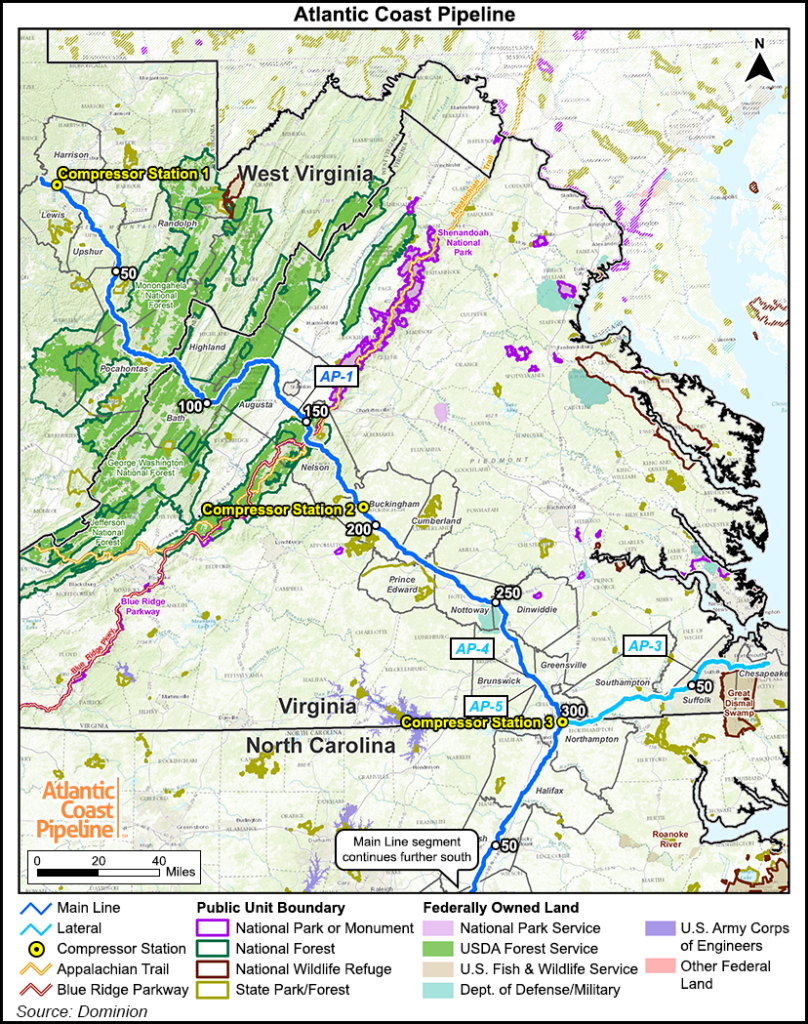Shale Daily | E&P | NGI All News Access
ACP’s Forest Crossing Permits Tossed as Fourth Circuit Finds Violations of Federal Law
Dealing yet another legal blow to the embattled Atlantic Coast Pipeline LLC (ACP), the U.S. Court of Appeals for the Fourth Circuit has ruled that the U.S. Forest Service (USFS) erred when it signed off on the project’s plans to cross federal lands.

In an opinion published Thursday, a three-judge panel for the Fourth Circuit found that the USFS violated federal laws in its authorizations for ACP to cross the George Washington and Monongahela national forests, as well as the Appalachian National Scenic Trail.
The ruling, which granted a petition for review filed earlier this year by the Sierra Club and other groups, remanded the Special Use Permit and Record of Decision that USFS had issued to ACP back to the agency to address a list of issues raised in the court’s opinion. The Fourth Circuit stayed the USFS approvals in September.
The judges cited a record of concerns that the USFS had raised during the Federal Energy Regulatory Commission’s environmental review process that appeared to go unaddressed.
“A thorough review of the record leads to the necessary conclusion that the Forest Service abdicated its responsibility to preserve national forest resources,” the Fourth Circuit wrote. “The conclusion is particularly informed by the Forest Service’s serious environmental concerns that were suddenly, and mysteriously, assuaged in time to meet a private pipeline company’s deadlines.”
Finding that USFS acted “arbitrarily and capriciously” in approving ACP, the Fourth Circuit said the agency violated the National Environmental Policy Act by failing to conduct an “independent review” of the project’s impacts and determine that its concerns had been addressed. Among the issues identified, the court said USFS “dropped its demand that off-forest alternative routes be studied” before approving ACP.
The 60-page opinion also identifies multiple violations of the National Forest Management Act. Among the points raised, the judges took issue with a series of USFS project-specific amendments to its standards for protecting the George Washington and Monongahela forests.
The Fourth Circuit also vacated the USFS decision to grant a right-of-way to cross the Appalachian Trail, finding that the agency does not have statutory authority to do so under the Mineral Leasing Act.
ACP spokesman Aaron Ruby said the company intends to appeal the decision.
“We strongly disagree with the court’s ruling,” Ruby said. “The court’s decision is at odds with the consensus of the U.S. Department of the Interior, U.S. Department of Agriculture, National Park Service” and USFS.
“All of these agencies agree that the Forest Service has the full legal authority to approve the Atlantic Coast Pipeline’s crossing of the Appalachian Trail. Under Democratic and Republican administrations alike, for decades 56 other oil and gas pipelines have operated” across the trail. “This opinion brings into question whether or not these existing pipelines can remain in place.”
The latest legal setback for ACP appears likely to further delay the project, according to analysts with Washington, DC-based ClearView Energy Partners LLC, who estimated that it could take ACP and federal agencies six months and up to a year to address the court’s concerns, “assuming the issues identified by the court can indeed be addressed.”
Alternatively, “the project sponsors could attempt to reroute the pipeline around national forest lands,” ClearView analysts said. “Rerouting the project around the national forests could potentially moot the appeals against the flaws in the reissued Biological Opinion and Incidental Take Statement related to protected species,” which were suspended separately and apply to the same national forest areas.
However, rerouting the project would bring its own set of challenges likely not accounted for in the current schedule, the analysts said.
The 600-mile ACP would originate in West Virginia, pass through Virginia and into North Carolina to move 1.5 Bcf/d of Appalachian natural gas to the Southeast. The project, backed by Dominion Energy Transmission Inc., Duke Energy Corp., Piedmont Natural Gas and Southern Company Gas, has targeted a 2019 in-service date.
Since receiving its FERC certificate in a split vote last fall, the project has faced a series of unfavorable legal and regulatory decisions that have threatened to delay construction progress, including a FERC order that stopped all work in August after the Fourth Circuit vacated key permits issued by the U.S. Fish and Wildlife Service and the National Park Service.
The Southern Environmental Law Center, one of the groups challenging ACP, celebrated the Fourth Circuit’s decision.
“The George Washington National Forest, Monongahela National Forest and the Appalachian Trail are national treasures,” said Patrick Hunter, an attorney with the group. “The administration was far too eager to trade them away for a pipeline conceived to deliver profit to its developers, not gas to consumers. This pipeline is unnecessary and asking natural gas customers to pay developers to blast this boondoggle through our public lands only adds insult to injury.”
© 2024 Natural Gas Intelligence. All rights reserved.
ISSN © 2577-9877 | ISSN © 2158-8023 |
